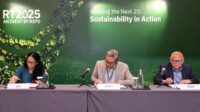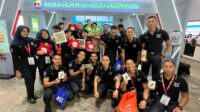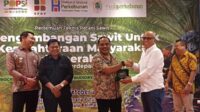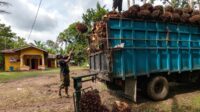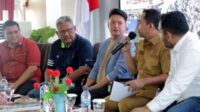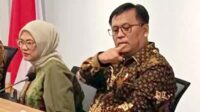PALMOILMAGAZINE, JAKARTA — The Business Director of Holding Perkebunan Nusantara PTPN III (Persero), Ryanto Wisnuardhy, emphasized the need for Indonesia’s plantation industry to shift from a production-oriented (product-centric) approach to a market-oriented (customer-centric) strategy. Speaking at the 2026 Plantation Commodity Outlook Forum on Tuesday (October 28, 2025), Ryanto said the shift is crucial to ensure competitiveness and sustainability in an increasingly dynamic global market.
“I’m very pleased with this forum, as the insights shared here will serve as an important reference in preparing our 2026 Work and Program Plan,” Ryanto said.
Also Read: PT RPN Unveils 2026 Strategy: Boosting Productivity, Downstream Value, and Sustainability
According to him, the use of data and analytical tools presented during the Outlook forum helps stakeholders better understand commodity price trends—key for designing forward-looking business strategies.
“For years, we’ve focused mainly on producing as much as possible and then finding a market later. But now it’s time to reverse the logic—understand what the market truly needs, and produce accordingly,” he stressed.
Ryanto cited several success stories within the PTPN Group that demonstrate the benefits of this paradigm shift, such as PTPN VIII’s Kayu Aro tea, which has regained profitability after realigning its products to match evolving consumer preferences.
Also Read: KPBN Inacom and Bursa Malaysia CPO Prices Weaken Amid Rising Production Pressure on Monday (Nov 3)
He also highlighted the importance of continuous innovation in upstream operations. “We need to develop new plant varieties suited to today’s soil and climate conditions, which are very different from those 30–40 years ago,” Ryanto noted.
In terms of business direction, PTPN Group will increasingly specialize its operations—focusing plantation units on production, while marketing and distribution will be managed by dedicated entities within the group. This separation is expected to enhance efficiency and clarify roles among subsidiaries such as Rajawali I, Rajawali II, Mitra Ogan, and Mitra Kelinci.
Ryanto further revealed that the company is preparing a sugar mill clustering strategy as part of a broader restructuring effort to strengthen the national sugar industry.
Beyond efficiency and market orientation, he reaffirmed PTPN Group’s strong commitment to sustainability and deforestation-free practices. “I’m proud of our field teams’ progress. Out of around 150 plantations, most are already RSPO-certified, and some even exceed international standards. Likewise, 68 out of 71 processing plants have obtained RSPO certification,” he said.
Ryanto concluded by appreciating the forum’s role in supporting policy and strategy formulation. “This event is essential for setting our direction forward, ensuring both profitability and sustainability for Indonesia’s plantation sector,” he said. (P2)









